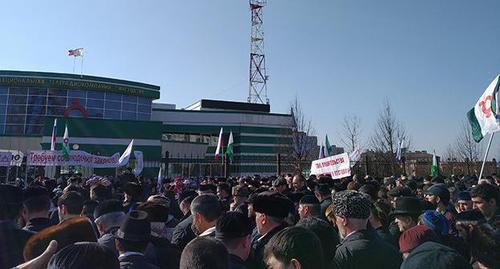Lawyers treat charges against Ingush activists as a precedent
Investigators explain clashes between Ingush activists and law enforcers in Magas with "political hostility" and used a case-law charge of "organization of violence," advocates note. A new form of persecution of activists can be used in cases on riots in other regions, the lawyers suggest.
The "Caucasian Knot" has reported that the investigators suggest that the leaders of the protests in Ingushetia, including Akhmed Barakhoev, Musa Malsagov, Ismail Nalgiev, Malsag Uzhakhov, and Barakh Chemurziev, were the organizers of the protestors' attack on the law enforcers.
On March 26, residents of Ingushetia demanding resignation of Yunus-Bek Evkurov extended, without authorities' permit, their protest rally in a square of the city of Magas. In the morning on March 27, this led to clashes with law enforcers.
When arguing the guilt of the Ingush activists, the investigators use statements about "political hostility," reports Andrei Sabinin, a lawyer of the "Agora".
"In their documents, the investigators describe the motives of the organizers [of the protest action] in such a way to argue that the activists experienced a 'sense of political hostility towards Evkurov'," Andrei Sabinin told the "Caucasian Knot" correspondent.
In Ingushetia, investigators are testing technologies of criminal investigations to be then applied in other regions of Russia, believes Vadim Klyuvgant, an advocate of the arrested Ingush activists.
"For example, I have not ever met such a construction of the charge 'organization of the use of violence against a public officer' ... Meanwhile, the investigators do not explain what kind of the organizational role [the Ingush activists] played exactly," Vadim Klyuvgant told the "Caucasian Knot".
This article was originally published on the Russian page of 24/7 Internet agency ‘Caucasian Knot’ on September 24, 2019 at 12:16 pm MSK. To access the full text of the article, click here.
Source: CK correspondent






![Tumso Abdurakhmanov. Screenshot from video posted by Abu-Saddam Shishani [LIVE] http://www.youtube.com/watch?v=mIR3s7AB0Uw Tumso Abdurakhmanov. Screenshot from video posted by Abu-Saddam Shishani [LIVE] http://www.youtube.com/watch?v=mIR3s7AB0Uw](/system/uploads/article_image/image/0001/18460/main_image_Tumso.jpg)